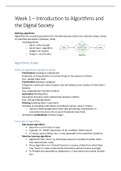Week 1 – Introduction to Algorithms and
the Digital Society
Defining algorithms
Algorithms are encoded procedures for transforming input data into a desired output, based
on specified calculations (Gillespie, 2014)
- 3 building blocks
o Input = data (recept)
o Set of rules = algorithm
(volgen van recept)
o Output = result (cake)
Algorithmic Power
What are algorithms capable of doing?
- Prioritization (making an ordered list)
Emphasize or bring attention to certain things at the expense of others
(e.g., Google Page rank)
- Classification (picking a category)
Categorize a particular entity to given class by looking at any number of that entity’s
features
(e.g., inappropriate Youtube content)
- Association (finding links)
Association decisions mark relationships between entities
(e.g., OKCupid dating match)
- Filtering (isolating what’s important)
Including or excluding information according to various rules or criteria.
o Inputs to filtering algorithms often take prioritizing, classification, or
association decisions into account (Facebook news feed)
- Sometimes combinations of these usages
Two types of algorithms
- Rule-based algorithms
• Based on a set of rules or steps
• Typically “IF - THEN” statements à {IF 'condition' THEN 'result’}
• (+) Quick, easy to follow, but (-) only applicable to the specified conditions
- Machine learning algorithms
• Algorithms that “learn” by themselves (based on statistical models rather
than deterministic rules)
• These algorithms are “trained” based on a corpus of data from which they
may “learn” to make certain kinds of decisions without human oversight
• (+) Flexible and amenable to adaptations, (-) but need to be trained, & black-
box
,= important distinction
- Black box = the idea that the algorithm makes a decision, but we don’t know why it’s
making that decision. Because the algorithm is learning by itself
à scary because no insights
Machine learning (ML) algorithms
- In data-intensive online environments, ML algorithms have become the standard
- Logic: train the algorithm on a sample of data, and then it can be used for making
predictions about other data
- Facebook, Amazon, Netflix, etc... use ML algorithms
• They have loads of data, thus the machine has lots to learn
• A few hundred lines of code can easily generate a model consisting of
millions of lines
- Example: Facebook’s DeepFace algorithm
• Surveillance capitalism (S. Zuboff) book
The level of automation in algorithms
There is no such thing as ‘the algorithm’
- Lots of differences in automation
- Humans should always be kept in the loop, so we should avoid number 10
Recommender Systems
- Recommender Systems are algorithms that provide suggestions for content that is
most likely of interest to a particular user (Ricci et al., 2015)
, • These algorithms that decide which content to display to whom based on
certain criteria
• Users are thus receiving distinct streams of online content
• E.g., news feed of FB, movies on Netflix, songs on Spotify, video’s on
YouTube, products on Amazon, etc.
- Rationale: avoid choice overload, to maximize user relevance, and to increase work
efficiency
- Personalization
Recommender Systems: Techniques
3 very important types of recommender systems!
- Content-based filtering: these algorithms learn to recommend items that are similar
to the ones that the user liked in the past (based on similarity of items)
- Collaborative filtering: these algorithms suggest recommendations to the user
based on items that other users with similar tastes liked in the past
- Hybrid filtering: these algorithms combine features from both content-based and
collaborative systems, and usually with other additional elements such as (e.g.,
demographics) [mostly used]
o E.g., Netflix’s recommender system
How people perceive algorithms
- There is some kind of paradox
Algorithmic appreciation
- People rely more on advice from algorithms than from other people (Logg, Minson,
and Moore, 2019)
- Despite blindness to algorithm’s process (“black-box”)
- Automation bias
• Humans tend to over-rely on automation (blind faith in information from
computers)
• Information from automation > information from humans
• Humans are imperfect, whereas computers are objective, rational, neutral,
reliable, etc.
• E.g., GPS system, automatic pilot, spelling checker
- You can never have blind faith in automation





